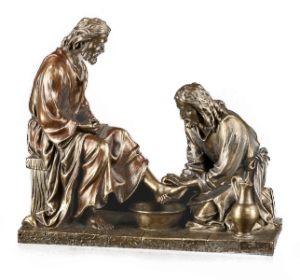 A saying of St. Philip Neri in the 16. century. gives courage to face up to Ash Wednesday. Ask the Ash Wednesday? For sure, when you look out the window into the streets of the city or village, perhaps only slightly. It should be noted no difference from other days. Yet this day is one of the turning points of the annual cycle.
A saying of St. Philip Neri in the 16. century. gives courage to face up to Ash Wednesday. Ask the Ash Wednesday? For sure, when you look out the window into the streets of the city or village, perhaps only slightly. It should be noted no difference from other days. Yet this day is one of the turning points of the annual cycle.
Today a cross of ashes on my forehead is drawn. There are many crosses, but this is a one-time in the church year Cross. Somehow, thought-provoking, even depressing for some. "From dust you come - and to dust you shall return" – is it [called. it reminds, All that we see around us and, is borrowed, even our own body. And it reminds us of the transience and responsibility, we carry with us. Responsibility towards those, who come to us - and that is what should make us then again hopeful. We may share some, further pay - trust, that others have some of our actions, hopefully enrich their lives and help them.
Therefore, the words of Philip Neri have a meaning on this day. For the others might indeed be those after us, we prepare the ground and leave. This does not necessarily have anything to do with death, because even if we are still alive, contact others in our footsteps. Here too it is, leaving orderly conditions and no chaos.
And he says moreover: “- if you can.” – This does not now serve for a more or less good or bad excuse, To shirk the matter. the human element so - no rather here is their own assets or an inability to consider. Each person has his strengths and weaknesses, the one more, the other less. The cross of ashes reminds us back here, for simplicity, the reduction to the essentials.
On Ash Wednesday is not the Holy Week, aber auch nicht der normale Jahreskreis. It is the beginning of a time of reflection and contemplation, a time of conscious forgoing, which can make us free. Ash Wednesday is like a traffic sign on the roadside, the einmahnt our attention to something Impending. Perhaps an encounter, that we prepare, to brace, our senses should raise it.
God is closer to us, than we might think. And an encounter with him is something, that requires our full attention. That's why: "Be good to others - if you can!“








